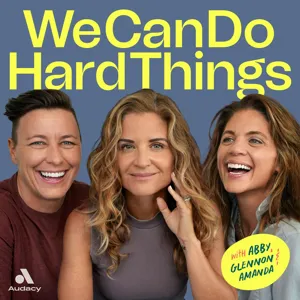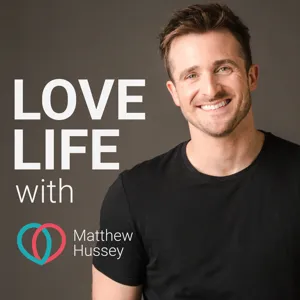Podcast Summary
The Importance of Conversation for Deeper Connections and Less Loneliness: Effective communication and listening are essential for forming meaningful relationships and combating feelings of isolation. Improve your conversational skills to connect better in all areas of life.
Effective communication and listening are crucial tools for forming meaningful connections and combating feelings of loneliness. 3rd Love understands this challenge in finding a comfortable and well-fitting bra, providing solutions through their innovative half cup sizes, virtual fitting room, and educational resources. In the same vein, we as humans have one primary tool to connect – conversation. However, many struggle with effective communication and active listening. With the increasing isolation brought on by social media and COVID-19, it's more important than ever to commit to improving our conversational skills. This not only helps us form better relationships but also enables us to make friends, connect with our kids, and excel at work. In essence, this conversation we're having today is about the importance of conversation in fostering deeper connections and feeling less alone. I, for one, have greatly benefited from Glenn's insights on this topic. If you find yourself struggling in any of the areas we'll discuss, remember that it's okay and there's always room for growth.
Five simple changes for better conversations: Structured conversations allow for vulnerability, understanding, effective communication, and deeper connections.
Conversations, like any creative endeavor, benefit from structure. Based on our personal experiences and observations, we identified five simple changes that can lead to better conversations. These guidelines are not meant to be restrictive or bossy, but rather to provide a safe space for vulnerability and understanding. By removing the pressure to perform certain roles in a conversation, individuals can show up as their authentic selves. The structure also allows for effective communication and prevents conversations from derailing. Ultimately, the goal is to create an environment where people feel seen, understood, and less alone. Just like AA's successful program, having a conversation with a clear structure can lead to deeper connections and meaningful interactions.
Interrupting in Conversations: A Battle and Disrespectful Behavior: Interrupting can prevent others from sharing their thoughts and identities, hinder the flow of ideas, and stem from fear or upbringing. Active listening and respecting others' right to express themselves fully are essential for effective conversations.
Interrupting in conversations can feel disrespectful and violent to some people. Abby, a guest on the podcast, shared her disdain for interrupting, describing it as a battle and an arrogant behavior. She explained how interrupting can prevent others from sharing their thoughts and identities. Abby revealed that this issue was a major problem in her marriage for several years, as her husband frequently interrupted her. Abby, who is an alcoholic and an interrupter, admitted that her behavior stemmed from her upbringing and her fear of forgetting what she wanted to say. She also highlighted the importance of understanding different perspectives on what a conversation is and how interrupting can hinder the flow of ideas. The discussion underscores the importance of active listening and respecting others' right to express themselves fully in conversations.
Living and dwelling in conversation: Be present and fully engaged, listen actively, respond thoughtfully, and strive for mutual respect and understanding to build deep connections in conversation.
Effective conversation is about mutual surrender and engagement, not just taking turns to speak. The original meaning of the word "converse" was to live or dwell with, emphasizing the importance of being present and fully engaged in the conversation. Interrupting or waiting to speak can hinder the flow of the conversation and prevent deep connection. It's important to listen actively and respond thoughtfully based on the evolving conversation. Additionally, cultural differences and neurodivergence can impact conversational styles, and it's essential to be aware of these nuances. The goal of a conversation should be to build connection and intimacy, not to dominate or interrupt. It's crucial to be mindful of our conversational habits and strive for mutual respect and understanding.
Value of silence in effective communication: Recognize the importance of silence and encourage quiet individuals to share their thoughts, avoid interrupting or filling silences, and focus on fostering deeper connections with others rather than proving personal worth.
Effective communication involves recognizing the value of silence and creating space for those who may not speak as often. It's important to remember that quiet individuals may have valuable insights to contribute and may simply need a little more encouragement to join the conversation. Interrupting or filling silences can prevent others from sharing their thoughts and hinder meaningful dialogue. Additionally, it's essential to understand that our communication styles are not a reflection of our character or moral worth. By acknowledging the importance of the "we" in conversation, we can shift our focus from proving our individual worth to fostering deeper, more meaningful connections with others.
Dominating talk time in diversity meetings: Addressing disrespectful behavior in meetings can lead to productive conversations, but keeping confidences is essential to build trust and foster genuine connections.
Effective communication and respect for others are crucial in building strong relationships and creating inclusive environments. The speaker shared an experience where three men dominated the talk time during a diversity and inclusion meeting, which she considered a moral issue. When she addressed the issue, two men became defensive and left the meeting. However, the incident led to a productive conversation among the remaining participants. The speaker also emphasized the importance of keeping confidences to build trust and establish genuine connections. She acknowledged the temptation of gossip but warned that breaking confidences can be counterproductive and damage relationships. Overall, the speaker encouraged the importance of mindful communication and respect for others to foster positive and inclusive interactions.
Understanding the Power of Gossip and Self-Disclosure: Gossip can build connections and stay informed, but it can also harm with negativity. Self-disclosure strengthens relationships and increases personal health, but be mindful of the impact on others.
Gossiping and self-disclosure are natural human behaviors with both positive and negative aspects. While gossip can be used to build connections and stay informed, it can also be harmful when used to spread negativity or distrust. On average, we spend 60% of our conversations talking about ourselves due to the neurological buzz it provides, but it's important to know when to share and when to listen. Self-disclosure can strengthen relationships and increase personal health, but forcing comparisons or drawing parallels to our own experiences can make others feel invisible instead of understood. It's essential to be mindful of our intentions and the impact of our words on others.
Understanding unique experiences through active listening and thoughtful questions: Asking thoughtful questions and actively listening validates feelings and creates meaningful connections. Recognize the value of undivided attention and genuine curiosity in conversations.
Effective communication and empathy in conversations require understanding the unique experiences of others. Instead of focusing on our own stories, it's essential to ask thoughtful questions and actively listen to their responses. By doing so, we validate their feelings and create meaningful connections. Additionally, it's important to recognize that sometimes the most valuable thing we can offer is our undivided attention and genuine curiosity. Asking better questions can lead to deeper, more engaging conversations and help us tap into the rich emotional experiences of those around us.
Deep Conversations Lead to Better Understanding: Engaging in deep conversations with thought-provoking questions can lead to stronger relationships, understanding of oneself and others, and a sense of belonging.
Engaging in deep and meaningful conversations with others can lead to a better understanding of both the individuals involved and oneself. This can be achieved through asking thought-provoking questions that allow everyone to share their thoughts and experiences. Such conversations not only help build stronger relationships but also make us feel less alone and less weird as we realize that everyone has their unique challenges and burdens. Moreover, this conversation structure can be particularly helpful for those with social anxiety, as it provides a more equal and liberating platform for sharing. So, next time you're at a table, try initiating a deep conversation and give everyone a chance to share their gems. Remember, the goal is to ensure that everyone's voice is heard, and no one is allowed to cut each other off. And who knows, you might just become the "weird" family that's known for having intense conversations!
Exploring tools for deeper connections: Focus on active listening, open-ended questions, and talk-to-listen ratio for effective conversations. Try reducing talk time and increasing listening to deepen connections.
Effective conversation is not about following rules, but rather using tools to deepen connections with others. These tools include active listening, asking open-ended questions, and being mindful of your talk-to-listen ratio. By focusing on one of these areas, you may discover new insights about yourself and your relationships. For instance, I plan to work on reducing my talk time and increasing my listening during conversations. I encourage you to try one of these techniques and share your experiences. Remember, we can all do hard things and grow through the process. As Tish Melton and Brandi Carlile sing, "We're adventurers and heartbreaks on the highway, we're back, we've stopped asking directions." So let's continue the conversation and explore new ways to connect with each other. Don't forget to rate, review, and follow the show on your favorite podcast platform.






